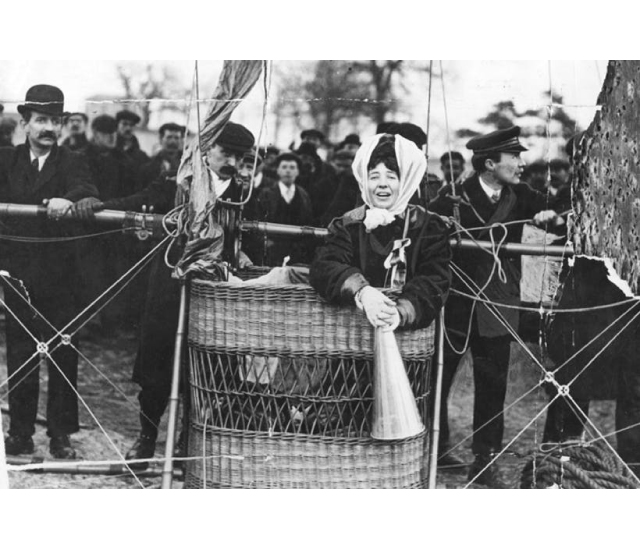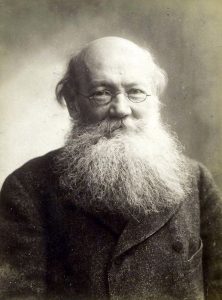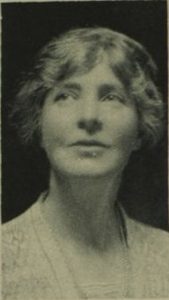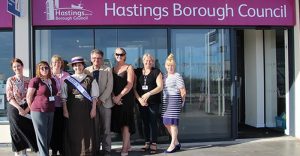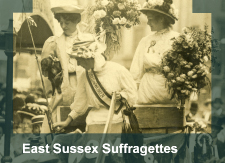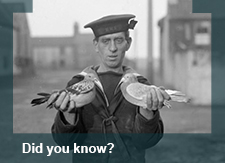Muriel Matters was a strong supporter Women’s Suffrage and opponent of the First World War who came to live in Hastings, East Sussex.
Born in Australia on 12 November 1877, Muriel took a keen interest in music. After studying the topic at the University of Adelaide she began giving public recitals and performances. However, in order to build a career in musical performance and acting she took the decision to leave Australia in 1905, and travel by boat to Britain.
Music and Politics
Following her arrival in London, Muriel began attempting a regular music career. Whilst she was able to give occasional recitals, the performance scene in London was already well-stocked in performers. Whilst still pursuing a music career she also found additional work as a journalist where she interviewed literary figures such as George Bernard Shaw and also radical revolutionary thinkers such as Peter Kropotkin.
Following her interview with Kroptokin she secured a recital at his house where he later challenged her to use her skills to further political aims. With Kropotkin’s challenge in mind, Muriel began involved with the Women’s Freedom League (WFL) and the cause of Women’s Suffrage.
Muriel toured the south-east of England in 1908, in a ‘Votes for Women’ caravan. Whilst allowing her the opportunity to give speeches in each town she visited, the primary objective of the tour was to help with the establishment of new WFL branches in Sussex, Kent, and Essex.
On 28 October 1908, Muriel and other members of the WFL staged a protest at the Houses of Parliament. In the ‘Ladies Gallery’ overlooking the main chamber of the House of Commons, a ‘Grille’ existed that purposefully obstructed women’s view of the proceedings. Muriel and a compatriot, Helen Fox, chained themselves to this Grille and began announcing the benefits of increasing the electoral franchise to the politicians below. Meanwhile, other WFL members staged simultaneous demonstrations elsewhere.
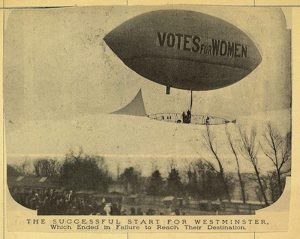
Muriel Matters’ hot air balloon. Image from: balloonteam.net
The entire Grille had to be removed, with Muriel Matters and Helen Fox still attached to it and moved to another room for a blacksmith to remove the chains. Muriel, 13 other women and one man, were tried the next day and convicted of willfully obstructing London policing. Each was sentenced to serve a month’s imprisonment.
This did not dissuade Muriel or the WFL and, in February of 1909, they flew a hot air balloon over London during the state opening of Parliament (although strong winds meant they never reached the Houses of Parliament themselves) and dropped political pamphlets on the people below.
The First World War
In 1910, Muriel Matters returned to Australia to give a lecture tour before once again returning to live in London.
The outbreak of the First World War in 1914, brought about significant divisions in the Women’s Suffrage movement. Some women suspended their political activities for the duration of the conflict in order to support the country. Others opposed the war and continued their political protests to varying degrees whilst the war was ongoing.
In 1915, Muriel Matters publicly decried not just this war but also the very notion of war itself. She declared that attempting to solve modern problems through military means not a successful course of action and that the justification for war was often built upon false pretenses.
She also took the additional step of decrying nationalism itself as a major course for militarism and international conflict.
The address where she gave these remarks in 1915 was later distributed as a political pamphlet by the Peace Committee of the Society of Friends.
After the war
Following the conclusion of the First World War and the subsequent increase of the electoral franchise to include some, but not all, women, Muriel Matters had the opportunity to fulfill a dream that many had thought would never be possible.
In 1924, Muriel Matters stood as the Labour Party candidate for Hastings in the General Election. The opponent was the Conservative candidate Lord Eustace Percy. Muriel’s platform was heavily socialist and she advocated for further equality for the sexes, and greater distribution of wealth in tackling poverty and inequality.
However, despite her best efforts, Muriel was defeated by Lord Percy who increased his majority in retaining the seat.
Four years after her electoral campaign, women across Britain were finally granted the same electoral franchise rights as men.
Muriel settled in Hastings with her husband, and eventually died in a nursing home in St Leonards in 1969.
On 5 January 2017, Hastings Borough Council honoured Muriel Matters, by renaming the main council offices to Muriel Matters House.

